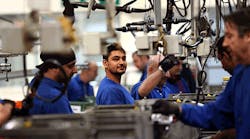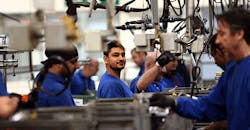Glassdoor analyzed 470,000 reviews on its website to assess the quality of benefits across job types. The site's users can rank 55 individual benefits and also entire packages on a scale of 1 to 5. Glassdoor dug into the data to see what industries have the best parental leave, 401(k) packages, and other perks.
"We wanted to know what can we learn from these reviews about where benefits are good and bad," said Glassdoor's chief economist Andrew Chamberlain. "Not just which industries offer benefits, but what is the quality of them."
Rather than look at the average ratings by industry, which can obscure diversity, the researchers looked at the full distribution of ratings.
Finance, tech, and manufacturing all had the highest average ratings, but also the most consistently high ratings.
(Photo by Carl Court/Getty Images)
That tech and finance companies offer the best benefits isn't all that surprising, but even Chamberlain didn't expect to see manufacturing so high up.
"It gets bad press because it's a declining industry in the U.S. and there's not a lot of job growth," he said. "But it is heavily unionized, and those workers are bargaining for quality benefits."
While coders and traders don't tend to belong to unions, they get their negotiating power from a different source. "These are very competitive labor markets," said Chamberlain. "These workers are hard to get and hard to keep."
Competition for talent has led to a perks and benefits arms race. Companies in these industries have beefed up parental leave policies and added new benefits, such as helping employees repay their student loans, in an attempt to attract and retain the best workers.
When Glassdoor dug into the data further, it found finance and information technology had the best maternity and paternity leave offerings, for example. Finance workers also have the highest-rated 401(k) plans.
Not everyone in the labor market has leverage, which has led to a benefit gap. While perks keep getting nicer and nicer for some workers, most people don't have access to sought-after benefits. Only 21 percent of companies surveyed by the Society for Human Resource Management offer paid maternity leave, according to its annual benefit survey, and the U.S. Bureau of Labor Statistics puts the figure even lower, at 11 percent as of 2012.
Even if they do get benefits, people in fields that don't have bargaining power, such as retail and food services, don't have highly rated packages, the Glassdoor survey found.
"These are low-skilled jobs, easy to replace," said Chamberlain. "Not a lot of union representation."
Benefits are an increasingly important part of compensation. Benefits make up a larger share of the compensation pie than ever before, and in some ways, they can be more valuable to workers than cash.
Parental leave, for example, is something that is "really hard to buy in the marketplace," said Chamberlain. It doesn't help that the jobs that tend to have the worst benefit packages also tend to pay the least, too.
So what can people do to get better benefits?
"Your first-best choice is to get skills and move into a field where you're more in demand," said Chamberlain, who admitted that many people don't have that option. "Your second-best choice is you should organize. That never hurts you."
That's easier said than done.
The Service Employees International Union, one of the nation's largest labor groups, has been trying to unionize fast-food workers for more than three years.
If neither of those plans works, Chamberlain suggests a third option: "You can use information to make you powerful," he said. The best hope is to find an employer such as Trader Joe's or Costco that treats its employees uncharacteristically well.
"There are a few needles in the haystack that do offer better benefits than others," he said.











